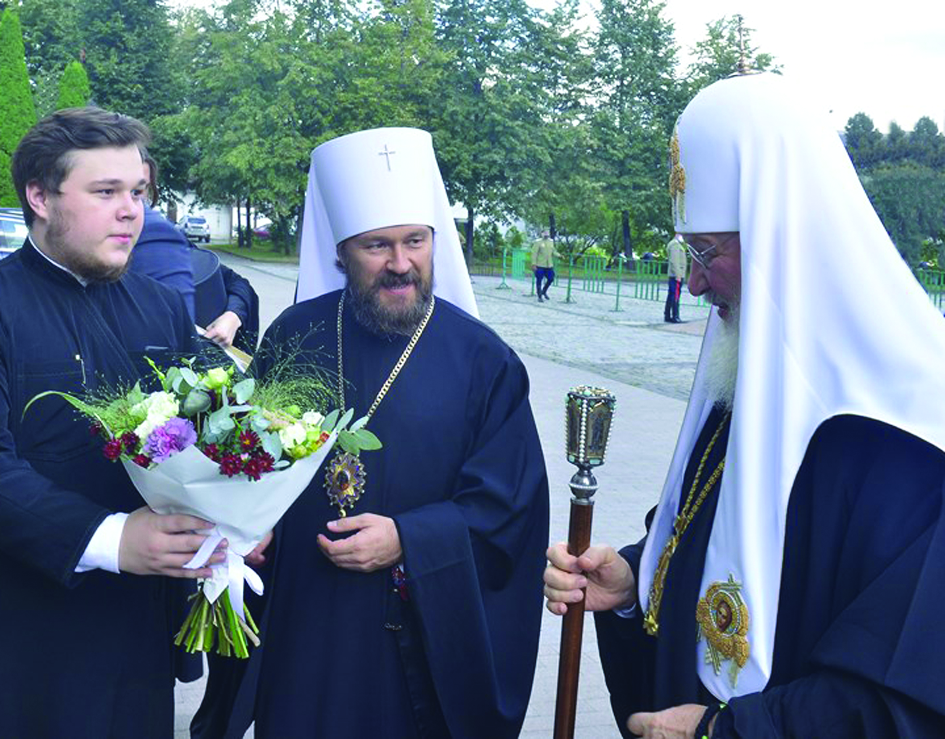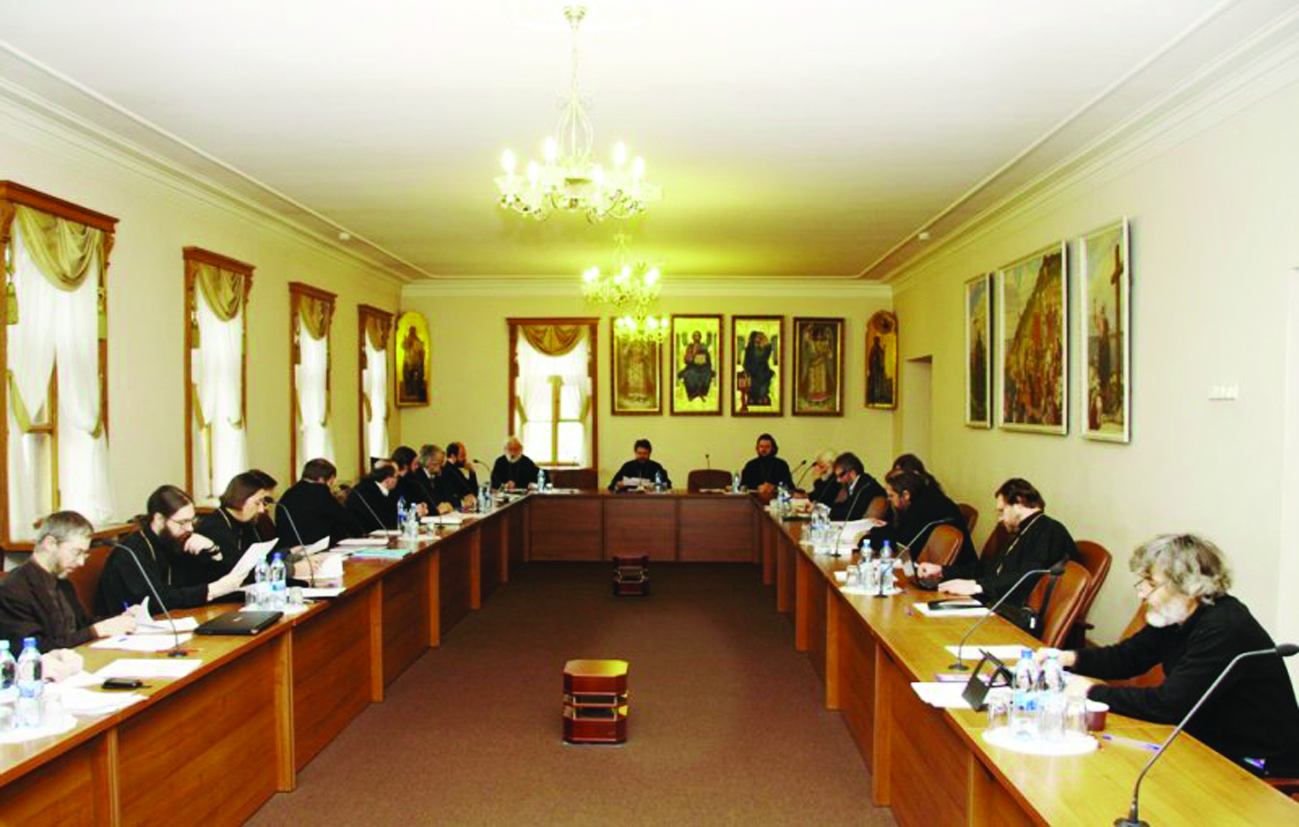In a blow to Catholic-Orthodox relations, Fiducia Supplicans has elicited a scathing theological analysis from the Russian Orthodox Church
By Robert Moynihan

Russian Orthodox Metropolitan Hilarion of Budapest and Hungary, chairman of the Russian Orthodox Synodal Biblical and Theological Commission, with His Holiness Patriarch Kirill of Moscow and All Rus’
The Vatican on December 18 published a text, Fiducia supplicans, which may go down as the most controversial and most ecumenically damaging document of Pope Francis’ pontificate.
At some point it will be necessary, for the good of the entire Christian world, to explain more fully the genesis and drafting of this text, but for now it seems important to study in detail the reasons why the text has generated such a negative reaction from non-Catholic Christians, some of whom, like the Coptic Orthodox, have said they will halt discussions aimed at overcoming the divisions between Christian after the publication of this text.
On March 25, the Russian Orthodox Church published a lengthy critique of the Vatican text (below).
At a time when Pope Francis has, courageously and against many critics, been seeking — after more than two years of war — to help launch peace talks to end the conflict between the Russians and Ukrainians, this Russian reaction on a theological matter directly undercuts the peace talks initiative, which Francis has said publicly is one of his most urgent concerns.
Excerpts from: “On the Orthodox attitude to the new practice of blessing ‘couples in an unsettled situation and same-sex couples’ in the Roman Catholic Church”
March 25, 2024
Prepared by the Synodal Biblical Theological Commission of the Russian Orthodox Church.
The declaration Fiducia Supplicans is a response to questions from the Catholic public regarding the document of the Congregation for the Doctrine of the Faith regarding the blessing of “same-sex couples” dated February 22, 2021 [“Responsum” ad “dubium” de benedictione unionem personarum eiusdem sexus et Nota esplicativa: AAS 113 (2021)] which explicitly stated the impossibility of blessing “samesex unions.” In the new document of the Dicastery for the Doctrine of the Faith, approved by the Pope, this unambiguous position is changed: it is proposed to recognize the blessing of couples in an “unsettled situation” and “same-sex cohabitation” as possible under certain conditions.
The ideas expressed in the declaration of Fiducia Supplicans represent a significant deviation from Christian moral teaching and require theological analysis.
1. About the “classical” and “expanded” understandings of blessing in this document
[…]
The “expansion” of the understanding of blessings is based only on the thesis that multiple moral attitudes “can obscure the unconditional power of God’s love on which the gesture of blessing is based” (FS, 12). Based on this thesis, the authors of the declaration propose to avoid situations where “a simple blessing would require the same moral conditions as for receiving the sacraments” (FS, 12).
The absence of moral requirements for those who are blessed is justified by the desire not to overshadow the love of God. However, God’s love for man cannot serve as a basis for blessing couples who are in sinful cohabitation. God loves man, but also calls him to perfection: “Be perfect, as your Father in heaven is perfect” (Matthew 5:48). God’s love for man calls him to renounce the sin that destroys his life. Accordingly, pastoral care for a person must harmoniously combine a clear indication of the inadmissibility of a sinful lifestyle with love that leads to repentance.
The document does not clarify what an “unsettled situation” means. Since “same-sex couples” are singled out as a separate category, it can be assumed that by “unsettled situation” we mean such cohabitation of a man and a woman that is not sanctified by the sacrament of Marriage.
The Fiducia Supplicans document says nothing about the need to canonically “settle” the relationship before receiving the blessing. Consequently, we are talking about introducing a certain form of indirect legitimation of what, in essence, is illegitimate, despite the clause made in the document that, by asking for such a blessing, a person in an “unsettled” cohabitation allegedly “does not intend to legitimize anything , but only opens his life to God, asks for His help to live better, and also calls on the Holy Spirit so that the values of the Gospel can be lived with greater fidelity” (FS, 40). […]
The Declaration says nothing about the fight against sin, about renouncing a sinful lifestyle, or about pastoral assistance to the believer in overcoming sin. The text of the declaration is compiled in such a way that one can conclude from it that a sinful lifestyle does not serve as an obstacle to communion with God. The Declaration is completely silent about the sacrament of Repentance as a necessary source of receiving Divine grace for everyone who would like to correct everything in their lives that is inconsistent with the will of God. […]
2. About the blessing of “same-sex couples”
The authors of the declaration state that the Catholic Church proceeds from the understanding of marriage as “an exclusive, stable and indissoluble union between a man and a woman, naturally open to the birth of children.” (FS, 4). This understanding of marriage corresponds to Orthodox teaching […].
However, along with affirming the inviolability of the understanding of marriage as a union of a man and a woman blessed by the Church, the text of Fiducia Supplicans proclaims the possibility of blessing “same-sex couples.” The entire section of the document devoted to these blessings is in radical conflict with Christian moral teaching. […]
To receive the blessing, persons in such cohabitation do not require, according to the document, any changes in lifestyle. Without any preconditions, those “who, recognizing themselves as destitute and in need of His help, do not claim the legitimacy of their status, but ask that everything that is true, good and humanly valid in their lives and relationships be complemented, healed and uplifted by the presence Holy Spirit” (FS,31) can receive the blessing that is sent “so that human relationships may mature and grow in fidelity to the Gospel message, free themselves from imperfection and weakness, and express themselves in the wider dimension of Divine love.” (FS, 31).
This application of the “expanded” understanding of blessings to “same-sex couples” causes fundamental disagreement. If the blessing is intended to heal human relationships by the presence of the Holy Spirit, then such healing in this case can only be the cessation of sinful relationships. In order to “mature and grow in faithfulness to the gospel message,” such a couple must abandon relationships that are not consistent with that message. Otherwise, blessing becomes an excuse for sin. Thus, the logic of the declaration can be assessed as contrary to Christian moral teaching.
It should also be noted that persons in sinful unions are called “dispossessed” (FS, 31) , as if a moral defect does not imply their conscious and free choice. The emphasis shifts from understanding the fact of the sinner making a moral decision to the disastrous nature of his situation.
The Fiducia supplicans document does not define “same-sex cohabitation” as sinful. An opposite example in this case can be the position of the Russian Orthodox Church, which gave an understanding of same-sex relationships in the document “Fundamentals of a Social Concept,” where homosexuality is directly and unequivocally called “sinful damage to human nature, which is overcome in spiritual effort leading to healing and personal growth of a person.” (Fundamentals of the social concept of the Russian Orthodox Church, XII, 9.) […]
Conclusions
The Declaration of Fiducia supplicans, while formally declaring fidelity to the Christian understanding of the sacrament of Marriage and the practice of blessings, actually postulates a sharp departure from this fidelity. As can be seen from the above analysis, this departure means a rejection of the Christian moral ideal. […]
From a theological point of view, the one-sided and incomplete understanding of God’s love for man, reflected in this declaration, seems very dangerous. In this understanding, the concepts of sin and repentance are actually removed from the relationship between God and man, which leads to such a paradoxical logic when people in sinful relationships resort not to repentance and spiritual work, but to some form of blessing in the hope of receiving “healing” and “elevation.” At the same time, the declaration does not articulate the fact that “healing” and “exaltation” must be preceded by at least the intention to renounce sinful relationships. […]






Facebook Comments